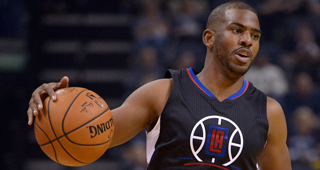Daryl Morey is typically met with a great deal of reverence for a dude with neither championships nor natural charisma, but he’s right when he says you get the talent first and figure out how to make it work later. There are exceptions to this rule. You shouldn’t grab three starting point guards—like the Suns did with Goran Dragić, Isaiah Thomas, and Eric Bledsoe a few years ago—and expect them to get along, and when Sam Hinkie, during his brief and terrifying reign, experimented with the logical extreme of Morey’s philosophy and treated players as wholly abstracted assets, it was gross and at least a little bit counterproductive. But as a general guideline, you’re more likely to succeed if you fill out your roster with the best players available as opposed to assembling them according to some unifying aesthetic. You don’t need a perfectly balanced squad to win a championship; you need one that’s really, really talented.
This year’s Rockets are going to test how far seemingly incongruous talent can go. A year after Mike D’Antoni found a way to make James Harden fun and more efficient than ever by moving him to point guard in a breakneck offense, Morey has acquired Chris Paul, who is the best point guard of his generation and also the most point guard: deliberate, demanding, and controlling. All three parties have some adjusting to do.
Harden is in many ways the quintessential Daryl Morey acquisition in that, coming off a poor NBA Finals with the Thunder and with the full breadth of his skill somewhat obscured by his limited role alongside Russell Westbrook and Kevin Durant, people were wondering how good he could be and Morey jumped at the opportunity to find out. Obviously, the bet paid off better than just about anyone could have expected. Harden quickly announced himself not just as a star but as the sort of player who defines a team’s identity. When you think of the Rockets, you think of Harden driving and kicking, Harden launching threes, Harden at the free throw line. Even after Dwight Howard joined him in 2013, the Rockets remained thoroughly Harden’s. (In a way that chapped Dwight, but then everything chaps Dwight.) For the first time since he was traded away by the Thunder, Harden isn’t going to have complete dominion over his squad. A year after nabbing the assists title and sporting the league’s fifth-highest usage rate, Harden will be forced to reduce and alter his role slightly to accommodate Chris Paul. He must once again learn to function occasionally as a secondary playmaker, cutter, and spot-up shooter.
The same is true of Paul, who unlike Harden has never been a secondary anything. In his rookie year, Paul averaged thirty-six minutes, twelve shots, and nearly eight assists per game. He was the franchise in New Orleans when he was running with David West and a crew of also-rans, and he was the franchise in Los Angeles while teamed up with Blake Griffin and DeAndre Jordan, both whom he regularly scolded during games. It’s possible Paul and Harden will drive each other nuts, given that the former is an authoritarian who believes there’s a right and wrong way to do everything and the latter is all about being able to do his own thing without interference. If the two are going to manage a work-friend detente, there will be no small amount of tongue-biting involved.
The most pressing conundrum the Rockets face is schematic. Mike D’Antoni only just reclaimed his reputation as a genius by putting Harden at the center of a modified Seven Seconds or Less offense and now he’s being given Chris Paul, who has never shown much inclination to run, partially due to his own sensibilities but also because he has slightly rickety knees that he looks after during the regular season before pushing them to their limit in the playoffs. Whether Paul obliged or not, it would be a dangerous proposition to have him sprinting the way the Rockets did last season, when they were third in the league in pace. In all likelihood, D’Antoni is going to need to find a way to slow games down a tad for his new point guard. He can stagger Harden and Paul’s minutes so that Harden can employ an uptempo style when Paul is off the court, but there are still going to be thirty-odd minutes per night when Paul is bringing the ball up the court and that’s a problem for D’Antoni to solve.
Daryl Morey’s approach to team-building could be described as searching for good problems. It’s better to have Chris Paul and not quite initially know what to do with him than to not have him at all. Though D’Antoni has been sunk in the past by stars who wouldn’t buy into his vision, Paul isn’t a volume shooter like Kobe Bryant or Carmelo Anthony. He wants to move the ball and create easy shots. He can probably run a modified, slightly less strenuous version of what D’Antoni would ideally like him to do. And if this all comes off—if Paul and Harden can cede a degree of responsibility to each other, If D’Antoni can keep his proven principles in place while also accommodating Paul—something unique and beautiful will emerge, which is the point of Morey’s experiments. Well, the point is to win championships, but Kevin Durant made a choice we’re all living with. Invention will have to be its own reward, which it thankfully is.
More Futures: Atlanta Hawks, Boston Celtics, Brooklyn Nets, Charlotte Hornets, Chicago Bulls, Cleveland Cavaliers, Dallas Mavericks, Denver Nuggets, Detroit Pistons, Golden State Warriors, Indiana Pacers, Los Angeles Clippers, Los Angeles Lakers, Memphis Grizzlies, Miami Heat, Milwaukee Bucks, Minnesota Timberwolves, New Orleans Pelicans, New York Knicks, Oklahoma City Thunder, Orlando Magic, Philadelphia 76ers, Phoenix Suns, Portland Trail Blazers, Sacramento Kings, San Antonio Spurs, Toronto Raptors, Utah Jazz, Washington Wizards



